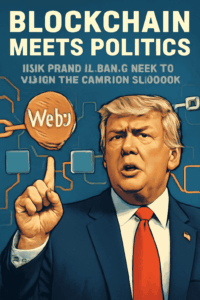In the ever-changing landscape of digital campaigning, Web3 technologies have started to play a significant role, transforming traditional political strategies. As blockchain continues to disrupt various industries, its integration into political campaigns is becoming a fascinating development. Among the many political figures embracing this new frontier is former President Donald Trump, whose use of Trump crypto and blockchain technology is reshaping how political campaigns are run.
This blog delves into how Trump is utilizing Web3 to take his campaign playbook to a whole new level, integrating blockchain, cryptocurrency, and decentralized technologies to engage voters, fundraise, and build his political brand.
The Rise of Web3 and Blockchain in Politics
Web3, the next iteration of the internet, powered by blockchain technology, has introduced a decentralized, user-centric digital world. It enables greater transparency, privacy, and security in online interactions. This emerging digital ecosystem is not just for finance and technology companies but is making its way into the world of politics as well.
Blockchain’s transparency and immutability offer a compelling advantage to political campaigns. As campaigns become more data-driven, blockchain technology allows for secure, auditable transactions and voting mechanisms, and even smart contracts to handle donations and fundraising. Trump crypto is just one of many examples of how political campaigns are exploring the potential of Web3 technologies to reinvent the way they communicate with voters and raise funds.

Trump Crypto: A Game-Changer for Political Fundraising
One of the most exciting aspects of Trump’s Web3 strategy is his use of Trump crypto. Cryptocurrency and blockchain are gaining traction in political fundraising, and Trump is one of the high-profile figures who has incorporated these technologies into his campaign. By launching his own Trump-branded token or utilizing existing cryptocurrencies, Trump has tapped into the growing base of crypto enthusiasts and investors.
Trump’s campaign has recognized that the world of cryptocurrency can be an excellent source of fundraising, especially in a time when traditional political donations are increasingly scrutinized. Using cryptocurrency, supporters can donate to his campaign quickly, securely, and in an efficient manner, circumventing some of the obstacles faced with traditional financial institutions. Trump crypto could open new avenues for campaign donations, bringing in a tech-savvy, younger audience who may otherwise feel disconnected from traditional political fundraising.
Moreover, the decentralized nature of cryptocurrency allows for more transparency in political donations. Blockchain records every transaction, providing a verifiable, transparent ledger of donations and contributions, which could help reduce concerns about transparency and corruption that are often associated with traditional political funding.
Web3: Reimagining Voter Engagement
Blockchain technology’s impact on politics goes beyond fundraising. Trump’s campaign is using Web3 tools to engage with voters in entirely new ways. One of the most notable innovations is the use of non-fungible tokens (NFTs) as part of his campaign efforts. NFTs are digital collectibles that can represent a wide range of things, from artwork to tickets, and even voting rights in some cases.
In the case of Trump’s campaign, Trump NFTs could be used to incentivize supporters and rally voter participation. For example, owning a Trump NFT might grant supporters exclusive access to campaign events, special merchandise, or even voting rights in campaign-related decisions. The potential for using NFTs as a new form of voter engagement and rewards is immense, offering both digital interaction and tangible benefits for supporters.
Furthermore, Web3 technologies like Decentralized Autonomous Organizations (DAOs) could play a role in shaping the future of campaign governance. DAOs allow communities to govern themselves using blockchain-based voting mechanisms, where members can participate in key decisions. Trump’s use of DAOs could encourage a more participatory and engaged supporter base, with voters having a say in campaign decisions such as policy initiatives or ad spend.
Blockchain and the Future of Digital Campaigning
As blockchain technology matures, its applications within politics will continue to evolve. The potential for Web3 to reshape the political landscape is vast, particularly in areas like campaign transparency, voter engagement, and fundraising. Trump’s innovative use of blockchain and Trump crypto could set the stage for future political campaigns that are more transparent, efficient, and engaging.
However, the intersection of politics and blockchain also brings challenges. Regulatory concerns around the use of cryptocurrencies in campaigns, the security of Web3 tools, and the potential for voter manipulation through digital technologies are all issues that need to be addressed. As these technologies continue to grow, it will be essential for lawmakers to establish frameworks that balance innovation with regulation.
Trump’s embrace of Web3 signals a potential shift in how future political campaigns will operate. The technology’s potential to disrupt traditional campaign finance models, voter outreach strategies, and digital content creation is just beginning to be explored, and Trump is positioning himself at the forefront of this revolution.
The Role of Trump in Shaping Web3 Politics
While Trump may not be the first political figure to explore blockchain and crypto, his campaign’s embrace of these technologies could mark a turning point in how Web3 is integrated into the political process. As more politicians look to connect with younger, tech-savvy voters, Trump crypto could pave the way for a new era of digital campaigning that aligns with the future of the internet.
Whether or not Trump’s use of blockchain in his campaign will become a widespread trend remains to be seen. However, his efforts to leverage Web3 for political engagement, fundraising, and transparency are undoubtedly paving the way for others to follow.
Conclusion
Blockchain and Web3 technologies are reshaping industries across the board, and politics is no exception. With Trump’s innovative use of Trump crypto and blockchain-based tools in his campaign, he is setting a new precedent for how political campaigns can evolve in the digital age. As the world of Web3 continues to grow, expect more political campaigns to explore these technologies, potentially leading to more transparent, decentralized, and participatory elections.
Trump’s strategy could very well become a blueprint for future campaigns, and his efforts to embrace Web3 may represent a fundamental shift in how politicians engage with the public. In the coming years, we may see a new wave of blockchain-driven political campaigns that utilize the full potential of Web3 technologies to reshape democracy.

John Cassidy is a senior columnist at egodcoin.io, specializing in economic and political analysis. He has authored bestsellers like How Markets Fail and Dot.Con, and is currently working on a new book about capitalism and its critics. Born in Leeds, UK, he holds degrees from Oxford, Columbia, and NYU, and resides in Brooklyn with his family.
